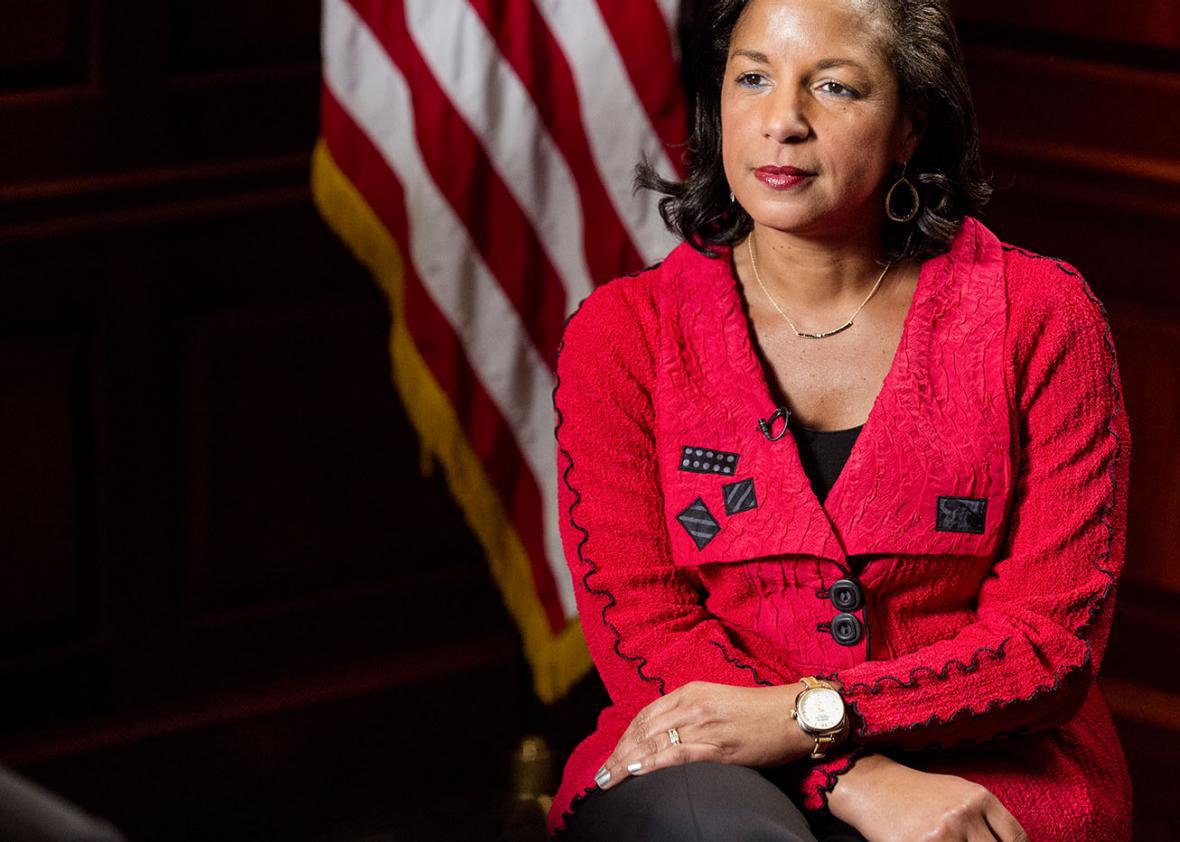President Trump and his aides have been doing all they can to divert attention from the mounds of evidence linking him or his campaign aides to Russian intelligence, but the latest distraction—the Susan Rice “unmasking”—ranks among the most desperate. Yet because the issues it raises are so obscure and confusing, it might also prove among the most effective. So let us wade into the muck.
Here are the facts, as we now know them. Sometime after the 2016 election, Susan Rice, President Obama’s national security adviser, obtained transcripts of telephone conversations in which Russian officials were discussing members of Trump’s transition team. It is unclear, from the news accounts, whether the Russians were talking with these team members or simply talking about them. Either way, under strictly observed law, the National Security Agency, which intercepted those phone calls, is required to redact the names of all American citizens or residents who happen to take part, or be mentioned, in such conversations—and, instead, to identify them as “U.S. Person 1,” “U.S. Person 2,” and so forth. As a result, the names of Trump associates in the Russian phone calls were “masked” in the transcript.
The charge is that Rice asked the NSA to unmask the names. According to Eli Lake, in Bloomberg News, this is the big revelation that Rep. Devin Nunes, chairman of the House Intelligence Committee, learned during his secret visit to the White House on March 21 and described in vague terms to reporters the following day. Nunes and some other Republicans say this supports Trump’s claim that the Obama White House had Trump’s team under surveillance.
Further outrage comes from the editorial page of Tuesday’s Wall Street Journal, which describes Rice’s request for the uncensored names as “highly unusual—and troubling” and says of Nunes’ allegation, “Now we know he is onto something.” In fact, however, Rice’s request was not at all unusual or troubling. Nor does the whole business lend the slightest support to the (thoroughly rejected) notion that the Obama White House was spying on Trump’s team.
I asked retired Lt. Gen. Michael Hayden, former director of the National Security Agency, whether it’s unlawful or even unusual for someone in Rice’s position to ask the NSA to unmask the names of Americans caught up in intercepts. He replied, in an email, “Absolutely lawful. Even somewhat routine.”
He added, “The request to unmask would not be automatically granted. NSA would adjudicate that, although I’m certain a request from the national security adviser would carry great weight.”
Hayden also said, “There are very plausible, legitimate reasons why she would request such information.” Though he didn’t elaborate on what those reasons might have been, the pertinent regulations specify that unmasking might be requested, and allowed, if the names in question are pertinent to foreign intelligence. When Rice made her request, there were ongoing investigations of Russia’s involvement in the election, of the role Trump advisers might have played in this involvement, and of efforts by some of these advisers to undermine U.S. foreign policy, specifically on sanctions toward Russia.
It’s worth noting that we don’t know—or at least no news story about the incident has reported—whether the NSA granted Rice’s request and gave her the unmasked names. Even if she did, Hayden emphasized in his email, “the identities would be unmasked only for her”—and not for any other official who received the transcript.
“To summarize,” Hayden wrote in his email, “on its face, not even close to a smoking gun.”
It’s hardly out of the ordinary for a White House official like Rice, with high security clearances, to request unmasking. In Tuesday’s Washington Post, Glenn Kessler quotes Michael Doran, a former NSC aide under President George W. Bush, as saying, “I did it a couple of times.”
Another former NSC official, who asked not to be named, told me, “There is a well-established, well-used process for requesting that such information be revealed. You have to have a reason beyond simple curiosity that is tied to some legitimate national-security or law-enforcement purpose.” The intelligence agencies, the ex-official added by email, “take this requirement VERY seriously.” Though this ex-official knows nothing about the situation with Rice, he said that, since she was doing transition work with Trump’s team at the time, it would have been “highly relevant to know whether these people were talking with the Russian government as well.”
For all the drama about these charges (“Susan Rice Unmasked,” blares the Journal editorial), no one has alleged she’s guilty of violating any rules. Lake’s article in Bloomberg News conceded, “Rice’s unmasking requests were likely within the law.” The Journal allowed, “The surveillance was legally authorized.”
Hayden allowed that “appropriate officials” might want to investigate precisely why Rice asked for the names or whether she shared the information she received (if she ever actually received it). But even these matters are irrelevant to the real question at hand: whether Team Trump colluded with senior Russian officials to tilt the election. The Rice story is not even relevant to what Trump has tried to depict as the real question: whether Obama was spying on Trump Tower.
